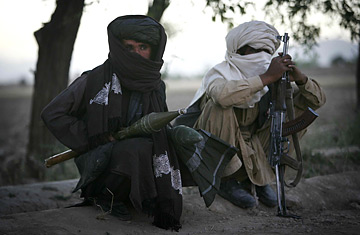
Some of Mullah Nagib's Taliban fighters at a meeting before they go on operation against the coalition forces and the Afghan police, in Ghazni, Afghanistan, on Saturday, July 8, 2006.
Soft Taliban, he explains, comprise about 95% of the Taliban force. "They very much want to join the government, provided that they have security and opportunities for work," he says. But it would help if government subsidies came their way. Says Meerza: "There is still a great distance from here to Kabul... There is very little incentive from the government to cooperate." He says Pakistanis are offering $1,000 stipends to commanders who join the Taliban, that he's been approached himself. And the Kabul government's counter-offer to work against the Taliban? $10. "There's no incentive," he says repeatedly. He says that the anti-government fighters have varying motivations. "Sixty to seventy percent are fighting for the money," he says. "Thirty to forty percent are fighting for Islam."
And the hard Taliban? "Those five percent," Meerza says, "are very forceful. They use extortion and are always in and out of Pakistan." The hard Taliban deploy to the frontlines of the war against the Afghan government and the International Security Assistance Force (ISAF), the U.N.-mandated coalition that is attempting to secure Afghanistan against insurgency. These extremists, says Meerza, "are looking everywhere for insurgents who could be a threat to them. Even I would have a very difficult time infiltrating them."
In a separate interview, a clearly "harder" Taliban reverses Meerza's statistics. Mullah Rahmatullah says "95% are supporting [Mullah Omar, the fugitive founder of the Taliban]; 5% are soft Taliban and will not fight." Rahmatullah commands about 10 men, many of whom live with their families in Pakistan. "We have several training camps there and we receive everything from them: money, equipment, weapons. In Baluchistan, we have three camps of Taliban and there are other places as well." He complains, "Religious people no longer have power in Afghanistan. This is not the case in Pakistan."
Meanwhile, Mullah Noor Ahmad, a Taliban commander of 15 fighters and an admirer of Mullah Omar from the beginning, makes no excuses for the Taliban's tactics, including suicide attacks. "They have proven very useful," he says. "Very effective... Any method that kills the enemy is acceptable. This allows us to spend money, for example, to fight face to face or from a distance, or even fight with the pen. Anything in order to win the war. And if I am killed, I will go to paradise." He adds, "The Taliban will hit anyone who is working with the coalition." He has no doubts about their progress. "All the time we are successful... Fifteen Taliban are equal to one hundred fighters."
Meerza sees the Taliban as resurgent as well but believes their success stems from other causes. "If things remain the same," he says, "in two years the Taliban will have control of 80% of the people. This is due to corruption in the government — and a lack of trust." Many Afghans in the southern provinces are now increasingly trusting of the old religious warriors, who ensure peace and safety from bandits in places where the police and the Afghan army are ineffective. Says Meerza: "Now the Taliban have a good relationship with the people. They no longer take food and water by force." Rahmatullah says, "What we want are posts in [President Hamid] Karzai's government. As soon as we are part of the government and as soon as all foreigners leave, we will stop fighting." Until then, he says, the Taliban will continue taking over the country. "People simply recognize who is the most powerful," he explains; "they want whoever has the most power."
Robert Densmore is an independent journalist and a veteran of the global war on terrorism. His work focuses on Afghanistan's human element, from military, political, and civilian perspectives.
